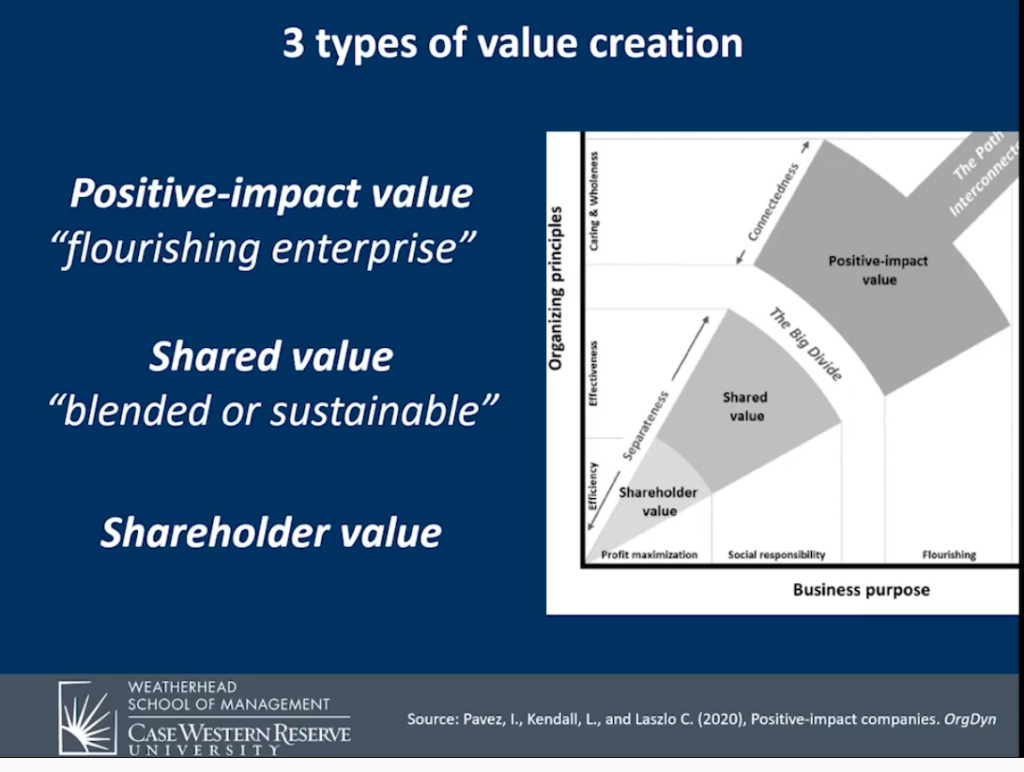The undeniable effects of climate change, global pandemics, and growing income inequality have heightened corporate awareness of the need to incorporate sustainability into their business strategy. These social and global challenges offer also a unique opportunity to transform the role of business in society. A new paradigm and a global leadership reset are urgently needed.
In the backdrop of Net-zero targets, Reduce Emissions, Reduce Waste and Reduce Plastics (which are all extremely important) there is an exciting and bold body of work surfacing on beyond net-zero and going for positive impact value creation!
The B-Corp movement has been a leading example of this by rallying companies to use business as a force for good and to aim for being the best for the world rather than the best in the world. The new must-read book of Paul Polman “Net Positive: How Courageous Companies Thrive by Giving More Than They Take” offers a roadmap towards this new paradigm. More recently I learned about Positive-Impact Companies, Positive Institutions, or Flourishing Enterprises 1 which replaces shareholder primacy with greater purpose as the North Star for a company’s journey.
It is not long ago that we have been celebrating the movements of Do Less Harm and “Shareholder Primacy to Stakeholder Capitalism” but the notion of “Flourishing Enterprises” seems to guide us to aim for one step further by including in the business purpose the flourishing of people and planet and acknowledging the interconnected nature of business success with the long-term prosperity of the planet.

So, what are these Flourishing Enterprises?
According to David Cooperrider, “It is something every leader wants…. Flourishing enterprise is about people inspired every day and bringing their whole selves into the enterprise, it’s about agility and innovation arising from everywhere; and it’s about realizing remarkable relationship value with stakeholders, including customers and societies, and ultimately with a flourishing earth.” 2
Chris Laszlo3 referred to “Unilever, Orsted, Natura, Ikea, Triodos Bank, Eileen Fisher, Gro Intelligence, TOMS, Greyston Bakery, Beyond Meat, Headspace, and Kingfisher as examples of emerging Flourishing companies. These are for-profit businesses that compete on the basis of creating a positive impact for society and the environment. Their model for business success is that by creating prosperity in the communities that they are part of and by contributing to a regenerative natural environment and improving human well-being, they can actually be more successful than their peers that don’t have this focus.” (Of this list, Natura, Triodos Bank, Eileen Fisher, TOMS, Greyston Bakery are also B Corps) According to Laszlo, Flourishing enterprises embed 5 key factors in their organizational strategy:
- Positive impact (not only reducing harm but improving social, environmental or health dimensions)
- The approach is embedded in their life cycle (so not a pilot nor a part of the company but end to end)
- Radical innovation (not incremental)
- Socially inclusive
- Efforts aiming at system change
The concept of “doing well by doing good” (that there are investments where you can have both financial and social returns, i.e., impact investments) inspired me to write a book on Microfinance and Microfinance Investments4 in 2004. This concept has developed and expanded over the years as more evidence mounted that it is possible to achieve both goals and now, we can witness businesses changing their purpose to include the prosperity of people and the planet not only because it is the right thing to do but because it is the way for the business to thrive!
________________________________________________________________________________________
- 1 This concept has been created, researched analyzed, documented, and presented by Chris Laszlo, David Cooperrider, Ron Fry, Ignacio Pavez, and Lori D. Kendall.
- 2Presentation at the 5th Global Forum for Business as an Agent for World Benefit. “The Great Leadership Reset” Day 1: David Cooperrider on “The Discovery and Design of Positive Institutions: Harnessing the Power of Mirror Flourishing”
- 3Presentation at the 5th Global Forum for Business as an Agent for World Benefit, Day 5: Chris Laszlo on “Flourishing Enterprise”
- 4Felder-Kuzu, Naoko: Making Sense: Microfinance and Microfinance Investments, Murmann Verlag, Hamburg, 2004
